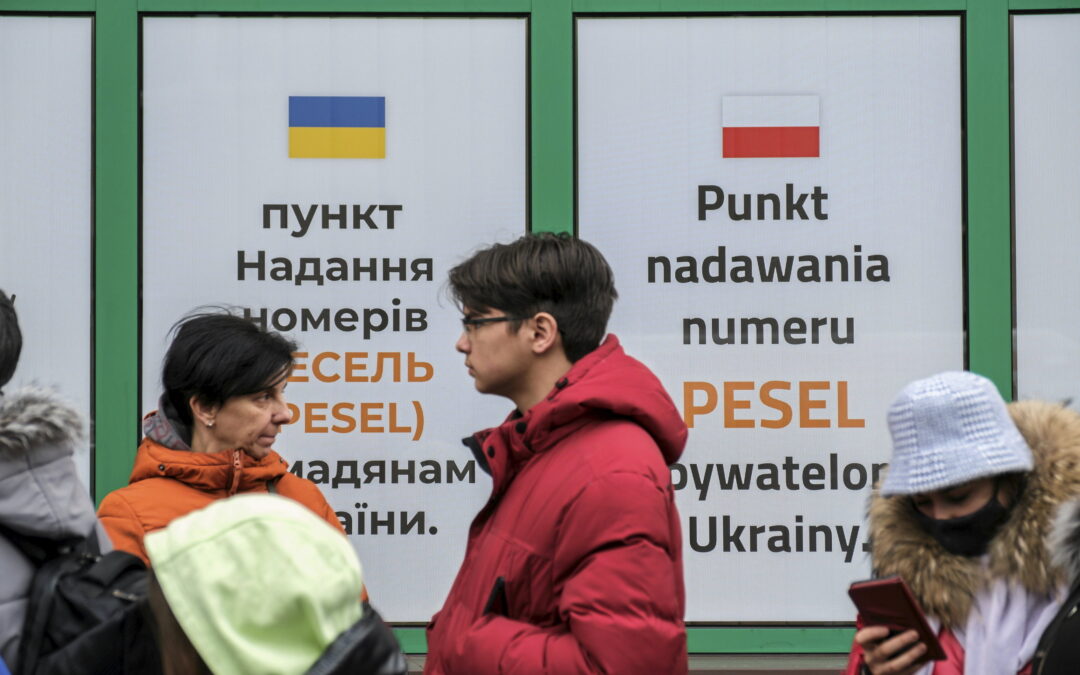Medical professionals among Ukrainian refugees may provide a boost to Poland’s healthcare system, which has long suffered from understaffing. Polish medical boards report that many Ukrainians are already looking for jobs.
To ease the process, the government has simplified the procedure for medics from Ukraine to start working in Poland and the health ministry has announced that it is launching language courses in medical Polish to ease their transition to working in Poland.
Figures from the OECD show that Poland went into the pandemic two years ago with the EU’s lowest number of doctors by population size, as well as one of the lowest numbers of nurses.
The situation has not subsequently improved, with the country’s Supreme Medical Council noting last year that a record number of doctors had applied to leave Poland.
In response, the health ministry had already, before the current crisis, been trying to encourage doctors from Ukraine and Belarus to come to work in Poland. Last year it also announced an agreement to boost spending on healthcare and increase salaries for medical staff.
Since Russia’s invasion of Ukraine three weeks ago, almost two million people have fled across the border into Poland. Last week, the government introduced a law to provide them with various forms of support.
The new legislation, among other things, makes it easier and quicker for the medics that had fled Ukraine to have their qualifications recognised in Poland and begin work.
Instead of taking a medical exam and going through the process of obtaining recognition of their diplomas by one of Poland’s medical universities, the simplified procedure allows Ukrainian medics to apply for a licence to practice issued by the health ministry and verified by the relevant medical board.
Moreover, some of the required documents can be submitted up to six months after the end of the military conflict, says the health ministry.
Another key requirement that has been waived, one that was previously a bone of contention between the ministry and medical boards, is that of passing an exam in the Polish language. Under the simplified procedure, a declaration of fluency in Polish is to be considered sufficient.
In order to help medics who do not speak Polish, the ministry announced that it is launching free language courses for doctors, dentists, nurses, midwives and paramedics.
The online course will last three weeks with classes taking place five days a week in small groups. Participants will receive free learning materials and the course will end with an exam. The limit of places is 500.
Centrum Medyczne Kształcenia Podyplomowego, z inicjatywy i na zlecenie #MZ, rozpoczyna realizację kursu z medycznego języka 🇵🇱 dla lekarzy, lekarzy dentystów, pielęgniarek, położnych i ratowników medycznych z 🇺🇦.
Więcej informacji 👉 https://t.co/EookZG440f pic.twitter.com/4wANPyFoAw— Ministerstwo Zdrowia (@MZ_GOV_PL) March 15, 2022
Even with the new measures in place, obtaining recognition of Ukrainian qualifications will still take some time, Alicja van der Coghen, spokeswoman of Silesian regional medical board, told Rynek Zdrowia.
“Even the shortest path, the ministerial path, which allows them to be granted a licence in a simplified form may take up to several months,” she notes.
“Ukrainian medics want to begin helping their compatriots in clinics and hospitals as soon as possible,” she added, noting that there are growing numbers of Ukrainian doctors indicating a willingness to work in the Polish health system.
Krzysztof Inglot, a labour market expert from employment agency Personnel Service, told Radio Zet that the government’s new simplified rules will allow Ukrainians “to fill in the gaps at healthcare facilities, which in the current situation, when both Polish and Ukrainian citizens need to be taken care of, require an injection of staff”
According to Personnel Service, last year over 4,100 Ukrainians were granted licences to work in health care and social assistance in Poland and the company expects there will be many more this year.
Poland’s education ministry and local authorities have similarly been seeking to hire qualified teachers from among Ukrainian refugees to help with an influx of tens of thousands of new Ukrainian children attending Polish schools.
Main image credit: Patryk Ogorzalek / Agencja Wyborcza.pl

Agnieszka Wądołowska is deputy editor-in-chief of Notes from Poland. She is a member of the European Press Prize’s preparatory committee. She was 2022 Fellow at the Entrepreneurial Journalism Creators Program at City University of New York. In 2024, she graduated from the Advanced Leadership Programme for Top Talents at the Center for Leadership. She has previously contributed to Gazeta Wyborcza, Wysokie Obcasy and Duży Format.




















